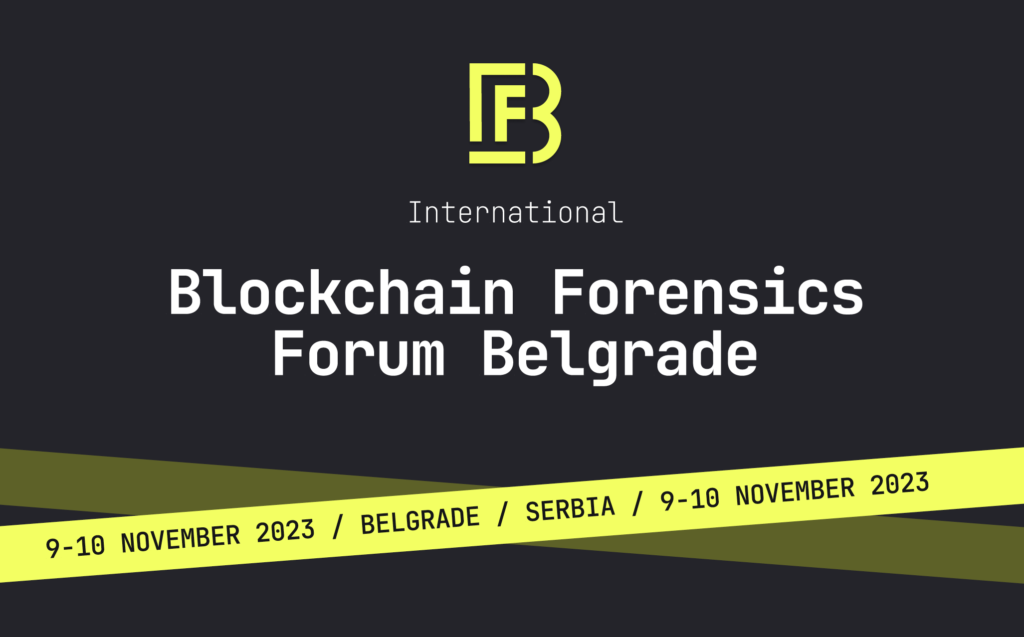Stanoje Rnić, Founder of Blockchain Forensic Forum, on blockchain forensics, money laundering through cryptocurrencies, and tackling cybercrime in the digital age

With the growing importance of digital finance in everyday lives of people, the rapid rise of decentralised finance (DeFi), through blockchain technology, has brought a new of set of emerging challenges, cantering around criminal acts such as illicit use of cryptocurrencies, identity theft, cyber-attacks, ransomware, and money laundering.
The Blockchain Forensics Forum, set to take place between 8th and 10th of November in Belgrade, is the first event in Southeast Europe specifically focused on addressing and combating illicit activities within blockchain and decentralised systems. The Forum will bring together global experts, software engineers, cryptocurrency investigators, as well as judges, prosecutors, and state representatives from Southeast Europe, in aims to help them proactively tackle the challenges associated with these emerging technologies. The AIRE Centre is proud to partner with Blockchain Forensics Forum, and bring the members of the Regional Asset Recovery Network to this event. With only a couple of days left until the Forum, we spoke with its Founder, Stanoje Rnić.
Can you tell us about your personal and professional motivations for choosing to work in the field of blockchain forensics?
Stanoje Rnić: I got into blockchain forensics mainly because I saw a growing challenge with the rise of decentralised finance. As money flows transition from traditional systems to decentralised finance, criminal activities follow suit. Growing problems with this emerging technology and my passion toward forensics led me to delve deeper into blockchain forensics.
What inspired you to organise the Blockchain Forensic Forum in Belgrade, and what do you hope to achieve with this event?
Stanoje Rnić: The field of Blockchain Forensics is primarily developed in a few advanced countries, notably the U.S. and Israel, among others. If this pivotal initiative were to successfully develop in our region, it could offer both rewarding careers and make a meaningful impact on society by assisting victims. The Blockchain Forensics Forum, along with our Digital Forensics Initiative ‘Archibald’, marks the beginning of this journey.
Could you explain what “blockchain” and “cryptocurrencies” are and why they are gaining increasing importance in the modern world?
Stanoje Rnić: Blockchain is a technology designed to ensure the integrity and transparency of recorded data. Once data is confirmed and added to the blockchain, it becomes very challenging to alter (for now). Cryptocurrencies represent one application of blockchain technology. Their decentralised structure distinguishes them from traditional financial systems, which appeals to many people. However, the technology faces significant challenges; one of these is the abuse of its very principles of pseudo-anonymity and decentralisation. We are here to address it.
How can these modern technologies be (ab)used for the purpose of committing criminal offences?
Stanoje Rnić: Cryptocurrencies can obscure fund origins, aiding money laundering and terrorism financing. Darknet marketplaces further facilitate drugs, illegal content, and violent services. This anonymity also encourages tax evasion, scams, and ransomware. Smart contracts, as shown in the DAO Ethereum attack, have vulnerabilities, highlighting the need for better code auditing.
Could you provide a brief overview of the existing gaps in blockchain regulation in Western Balkans? What regulations are in place to protect against, and prosecute these modern crimes in Western Balkans?
Stanoje Rnić: In Serbia, the Law on Digital Assets addresses these issues. As the technology swiftly evolves, it will influence the legislation, which will need to adjust accordingly.

Are there any notable cases in the Western Balkans involving cryptocurrencies that highlight the potential challenges or opportunities in the region?
Stanoje Rnić: While there are smaller, localised cases involving cryptocurrencies in the Western Balkans, I prefer to focus on larger global cases that include victims from our region. High-profile cases like those involving FTX, Terra Luna, and Celsius highlight the potential risks and misuses of this technology.
What can attendees expect to be the most important topics and speakers present in the upcoming Blockchain Forensic Forum in Belgrade?
Stanoje Rnić: At the Blockchain Forensics Forum in Belgrade, during the first panel attendees will dive into cyber forensics as a career, exploring skills, daily tasks in both public and private sectors, salary insights, and the field’s pros and cons. Second panel will delve into privacy concerns, highlighting potential and actual abuses. Third will present expert views on investigative methods and tools. Additionally, top U.S. companies from the industry will showcase their solutions to current challenges.
If you could recommend one book or publication that delves into the issues of blockchain forensics, cryptocurrencies, and their potential for misuse, which one would it be, and why?
Stanoje Rnić: I would recommend following current cases from the U.S. using available public sources, such as court reports and reliable media articles. For those more interested in analytics, I suggest reading reports from any of the prominent companies in the field, like the Chainalysis report.
***
Stanoje Rnić is a Belgrade-based criminalist specialising in combating cybercrime. His passion for computers and entrepreneurial mindset led him to starting his first digital business at the age of 13. During his studies in criminalistics, he worked on a number of projects as a data analyst and published a series of articles on cybercrime and social media in the Serbian daily newspaper Politika. Stanoje is the Founder of the Digital Forensics Initiative Archibald, which organises the Blockchain Forensics Forum. His mission is to raise awareness about the threats of crime in the digital space and build capacities in public and private sectors to combat cybercrime effectively.

